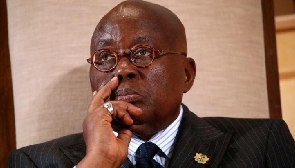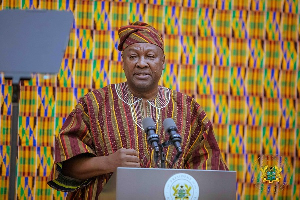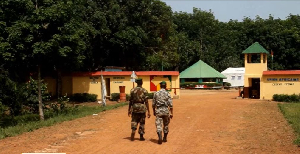The citizens of Ghana, in their conscious effort to see the country develop, tend to create opportunities for greater accountability and transparency, thereby making sure government representatives sit up in the cause of discharging their duties. The system of governance being practised in Ghana makes it possible for the President to appoint virtually every public official in the country. In this case, government appointees often find it difficult to render account to the citizens since they serve at the pleasure of the President.
Briggs and Mueller (1997) assessed that for over 50 years, developmental aids, strategies, and efforts have not entirely been successful in Ghana’s economy, in the quest of improving the standard of living of the many populace. It can, however, be assumed that over the years, the attempt of government to design and implement programmes, policies and strategies that will decline the poor living standards of the people in the country and in return, create a conducive atmosphere has been achieved with minimal success.
Looking at the fact that development in Ghana is a collaborative effort; both from the government and the citizens of the country, there is the need for active participation from the citizenry to be able to achieve this purpose. Community participation is a driving force that puts the government on their toes. It has the tendency to promote ideas, collective interests and aspirations that will benefit each and every member of the country. There are different perspectives about participation but more importantly, it has to do with people getting involved in decision making, contributing and monitoring how these decisions are going to affect the lives of public officials and the ordinary Ghanaian citizenry in general. When the citizens become active participants as the President clearly wants it to be “citizens and not spectators” or citizens.
1. vigilante, whatever decisions government make concerning the nation will be critically looked at and constructively criticized, whether good or bad. This is because, some of these decisions taken can go a long way to affect the development of the Ghanaian economy; positively or negatively.
Gone were the days when citizens of the country kept mute and watched the government do as they pleased, thereby taking the ordinary Ghanaian for granted. They are voted into power and the next thing they do is to forget the people that voted for them. The ordinary Ghanaian expect the people they voted for to fulfil every promise made to them when they came soliciting for votes. The citizens of this era are now active participants in our democratic economy. An instance can be drawn from the just-ended 2020 general elections. Constituents who felt their leaders failed them in fulfilling their promises or their inability to develop their electoral areas were voted against. They are to work for their people when voted into power, either than that they will be held accountable for their actions. This shows that active participation from the Ghanaian citizen is an essential tool to aid in the development of the nation.
According to the Human Development Report (UNDP, 1993), the participation of people aids in community development. This reiterates the fact that the lack of it (participation), is something that becomes a central issue in the face of the current challenges for development.
Further, the citizens of Ghana expect the government to create more jobs for the people, especially the youth. The country is seriously facing this canker called unemployment, making it difficult for us to develop as a nation. The country is still struggling with the causes of unemployment. A solution to this problem could mean better living conditions for the youth in Ghana as well as other people facing unemployment issues.
2. Government to understand that unemployment is a major contributor to the Ghanaian economy not growing as fast as it should. There is a need for government to invest in the area of entrepreneurship to help curb or decline the rate of unemployment in the country. One major cause of unemployment in Ghana is the ‘white-collar job’ mentality the citizens have. Every young graduate is so fascinated about working in the public sector, so much so that they easily forget the sector easily gets choked. Graduates are also made to believe that seeking formal employment in a well-respected establishment is a golden opportunity to become successful in life.
This makes them desperate in competing for the few vacancies the public sector has to offer, forgetting that they can create something decent for themselves. There is a lack of vocational support and training facilities needed to make the youth more of job creators instead of job seekers. The curriculum emphasizes more on academics while turning a blind eye to practical training for entrepreneurial benefits. This negligence has caused a lot of our youth to have no idea of the possible areas of employment. However, if government brings in their utmost support to invest in the entrepreneurial area, the unemployment situation in the country can reduce drastically.
Again, the high level of corruption in the country has greatly contributed to the nation facing developmental challenges. Lack of honesty among some government officials is causing retrogression in the country. Instead of using public funds meant for developmental purposes in various economic sectors, they rather embezzle these funds and use them for their personal gains. With all these happenings, the country will definitely lack development.
Ghanaian citizens expect government to provide the populace with their basic necessities. Most villages and towns in Ghana today lack good drinking water, motorable roads, hospitals, basic sanitation equipment, just to mention a few. These remain major problems preventing the growth
3. Potentials of the country. Ghana is virtually blessed with all the natural resources but one way or the other, poor governance and rampant corruption is the cause of all these problems, leaving the people of Ghana with nothing but poverty and despair.
In order to curb all these problems facing the nation and promoting development, we need prudent management of our resources for the people. Greediness and selfishness are what has engorged our development so far. We need to arise as good thinking Ghanaians and hold our leaders accountable for any form of bad governance. In this way, our country can be far better than how it is today.
The thrust of this write-up is that the development of the nation Ghana is hinged on demand-led community development. The development needs of communities in Ghana must be sectorial be defined and treated differently. We must not wholesale treat community development within government development frameworks as unison. Development needs in Accra, Kumasi, Takoradi, Tamale, Sunyani, Koforidua, and the surrounding communities should be disaggregated dealt with and so on for all regions in Ghana.
In conclusion, the citizens expect our government to wheel the governance machinery at the local and national level. They expect to be involved in what kind of development is provided at the local level (Community Driven-Led). There are many surprises awaiting political leaders if MMDAs leaders are not guided and are left to do what they want. Ghana requires a bottom-up approach to resource provision to fast-track our developmental needs. All hands on the development wheels with citizens, CSOs participation and adequate government monitoring.
Dr. Jamal Mohammed
Executive Director
Africa Development and Resources Research Institute (ADRRI)
Email: jamal@adrri.org
Opinions of Wednesday, 20 January 2021
Columnist: Dr. Jamal Mohammed















